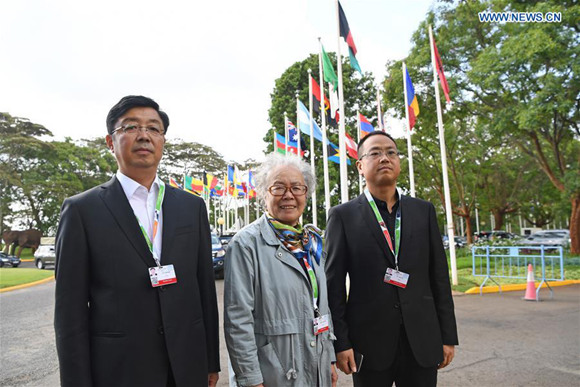
Representatives Liu Haiying, Chen Yanxian and Yu Shitao (L to R) from the Saihanba Afforestation Community pose for a photo in Nairobi, Kenya, Dec. 5, 2017. (Xinhua/Chen Cheng)
China's Saihanba afforestation community on Tuesday scooped a prestigious UN environmental award for its outstanding contribution to restoration of degraded landscapes, amid the national efforts to advance ecological civilization.
The announcement about Saihanba afforestation community emerging among top winners of the annual UN Champions of the Earth Award was made in Nairobi during the ongoing third edition of the United Nations Environment Assembly (UNEA3).
Erik Solheim, Executive Director of the UN Environment Programme (UNEP), hailed Saihanba community for pioneering innovative but cost effective grassroots led initiatives to reclaim degraded landscapes.
"The Saihanba afforestation community has transformed degraded land into lush green paradise-- part of a new Great Wall of vegetation that will play a part in helping protect millions from air pollution and preserving precious water supplies," Solheim remarked.
He added that the Chinese conservation group has inspired the global community to start a new conversation on effective measures to adopt in order to restore the health of vital ecosystems.
"The work is proof that environmental degradation can be reversed, and that this is an investment worth making," Solheim remarked, adding that grassroots initiatives have often proved to have profound impact on environmental conservation globally.
The Saihanba region that covers about 93,000 hectares in north China's Hebei Province almost became a waste land in the 1950s due to rampant felling of trees which made it possible for wind to blow sand into Beijing and adjacent regions.
Hundreds of foresters in 1962 embarked on tree planting in Saihanba given the heavy price they were paying due to rapid desertification.
Three generation of foresters from Saihanba have managed to increase the forest cover from 11.4 percent to 80 percent while the reclaimed landscape currently supplies some 137 million cubic meters of clean water to Beijing.
At the same time, the restored forest has stimulated growth of green sectors of the economy that generate an estimated 15.1 million U.S. dollars in 2016.


















































